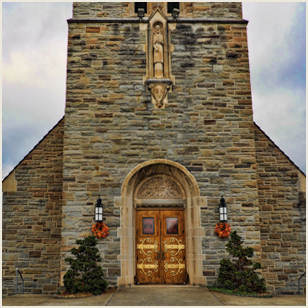Page: Quotes, Prayer (how), Quote Topic
There is no other name by which we must be saved. That we may be able always to pay attention to Christ, and be zealous in this at all times, let us call on him who is the subject of our thoughts at every moment. And of course those who call upon him need no special preparation or special place for prayer, nor a loud voice. For he is present everywhere, and is always with us; he is even nearer to those who seek him than their very heart. It is fitting, then, that we should firmly believe that our prayers will be answered.
–Saint Nicholas Cabasilas (c. 1321–1392)
Church, Page: Quotes, Quote Topic
God’s house is the whole world; God’s house is the Catholic Church; God’s house is also every faithful soul. But God inhabits the world in one way, the Church in another, and every faithful soul in yet a third. He is in the world as ruler of His kingdom; He is in the Church as head of the family in His own home; He is in the soul as the bridegroom in the wedding-chamber.
–Hugh of St. Victor (c. 1096–1141)
Page: Quotes, Quote Topic, Repentance
If a man has tar on his hands, he removes it with a little cleansing oil; how much more, then, can you be made clean with the oil of God’s mercy. You find no difficulty in washing your clothes; how much easier is it for the Lord to cleanse you from every stain, although you are bound to be tempted every day. When you say to the Lord, ‘I have sinned’, He answers: ‘Your sins are forgiven you; I am He who wipes them out and I will remember them no more’(Matt. 9:2; Isa.43:25); ‘as far as the east is from the west, so far have I removed your sins from you; and as a father shows compassion to his sons, so will I show compassion to you’ (Ps.103:12-13).
–Saint John of Karpathos (Seventh Century)
Page: Quotes, Quote Topic, Spiritual (life)
Those who are struggling in battle ought always to keep their souls free of the tumultuous waves of distraction. If they do this, the mind will be able to distinguish among the thoughts that come to it. The good thoughts, sent by God, they can store in the treasure-house of their memory. The evil thoughts, sent by the devil, they can throw out.
–Saint Diadochus of Photike (c. 400 – c. 486)
Page: Quotes, Quote Topic, Spiritual (life)
Five Signs of Spiritual Progress and Growth
ONE: If we are discontented with our present state, whatever it may be, and want to be something better and higher, we have great reason to be thankful to God. For such discontent is one of His best gifts, and a great sign that we are really making progress in the spiritual life…
TWO: Again, strange as it may sound, it is a sign of our growth if we are always making new beginnings and fresh starts… .. For these new starts seen something higher, and therefore for the most part something arduous; whereas fickleness is tired of the yoke, and seeks ease and change…..
THREE: It is also a sign of progress in the spiritual life, when we have some definite thing in view: for instance, if we are trying to acquire the habit of some particular virtue, or to conquer some besetting infirmity, or to accustom ourselves to a certain penance. All this is a test of earnestness, and also a token of the vigor of divine grace within us..
FOUR: But it is a still greater sign that we are making progress, if we have a strong feeling on our minds that God wants something particular from us… To feel then, with all sober reverence, this drawing of the Holy Ghost, is a sign that we are making progress. Yet it must be carefully remembered that no one should be disquieted because of the absence of such a feeling. It is neither universal nor indispensable.
FIVE: I will venture also to add that an increased general desire of being more perfect is not altogether without its value as a sign of progress: and that, in spite of what I have said of the importance of having a definite object in view. I do not think we esteem this general desire of perfection sufficiently. Of course we must not stop at it nor be satisfied with it. It is only given us to go on with.
–Frederick Faber (1814-1863)
John of the Cross (1542-1591), Page: Quotes, Prayer (problems), Quote Author, Quote Topic, Spiritual (life)
We may say that there are three reasons for which this journey made by the soul to union with God is called night. The first has to do with the point from which the soul goes forth, for it has gradually to deprive itself of desire for all the worldly things which it possessed, by denying them to itself; the which denial and deprivation are, as it were, night to all the senses of man. The second reason has to do with the mean, or the road along which the soul must travel to this union — that is, faith, which is likewise as dark as night to the understanding. The third has to do with the point to which it travels — namely, God, Who, equally, is dark night to the soul in this life. These three nights must pass through the soul — or, rather, the soul must pass through them — in order that it may come to Divine union with God… And, when this third night is past, which is the complete accomplishment of the communication of God in the spirit, which is ordinarily wrought in great darkness of the soul, there then follows its union with the Bride, which is the Wisdom of God.
–Saint John of the Cross (1542-1591)

